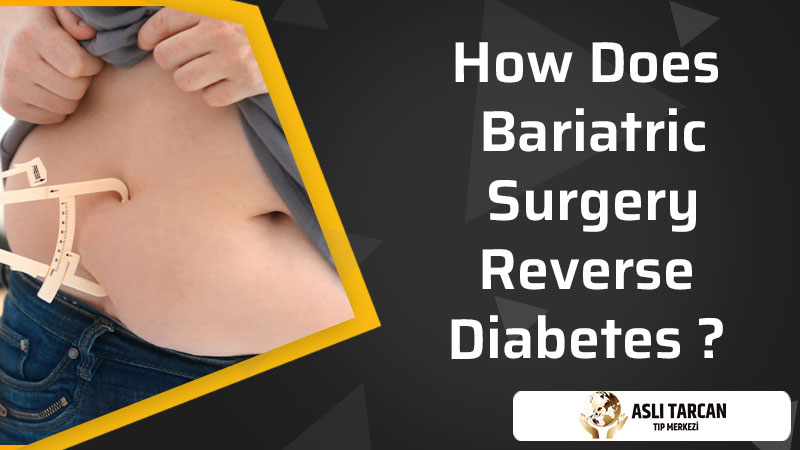How does bariatric surgery reverse diabetes is a topic that closely concerns both diabetes patients and obesity lines. As the name implies, obesity is characterized by an excess of adipose tissue in the body. In addition to heredity and environmental variables, obesity is also influenced by socioeconomic position, metabolic disorders, and medications. However, despite the fact that patients tend to blame these variables, the most fundamental cause of obesity is excessive food consumption.
The fast pace of modern living, the reduction of time spent in the kitchen, and the availability of food that can be made and consumed quickly and simply have all added to our daily existence. As far as veggies and fruits go, these meals are loaded with sugar, fat, and calorie content. They’re especially appealing to children’s and young people’s tastes.
How Does Bariatric Surgery Reverse Diabetes
The body mass index (BMI) calculates by multiplying the weight by the height As a rule of thumb, the optimum is 20 a body mass index of 25-30 kg/m2 overweight; a body mass index of 40 kg/m2 or above is considered morbid.
It’s also vital to know where the oil is coming from. Diabetes is more likely to occur if you have excess fat around your belly and waistline. Weight gain and Type 2 Diabetes links, with 80 percent of Type 2 Diabetics being overweight. Obesity leads to insulin resistance, which in turn promotes the development of the type. Additionally, obesity complicates diabetes therapy and blood sugar management. It is significantly simpler to regulate your blood sugar when you lose weight and exercise.
Roux-en-Y gastric bypass and biliopancreatic diversion are intestinal bypass operations that restrict caloric intake in the same manner as gastric banding and vertical gastroplasty do. There is an additional component of malabsorption due to the small intestine’s reduced size. When type 2 diabetes is remitted following gastric restriction surgery, especially in patients with a lengthy history of the illness and those who have been treated with insulin, more individuals (82 percent to 99 percent).
Bariatric Procedures And Their Effect On Reversing Diabetes
After bariatric surgery, individuals lose up to 25 percent of their total body weight, compared to standard weight-loss procedures. People with type 2 diabetes, on the other hand, have a better glucose control and require less drugs, and an average of 78% achieve normal glucose control without any anti-diabetic medications.
A few operations have more of an impact than others on weight and diabetes. Gastric restriction operations and intestinal bypass surgeries are the two primary kinds. The first categorization was based on the assumed mechanism of weight reduction.
Due to the reduction in stomach capacity, calorie intake reduces due to the feeling of fullness. Patients lose between 10 and 20 percent of their body weight thereafter.
Another study found that laparoscopic adjustable gastric banding remitted type 2 diabetes, while traditional medical treatment did not. Several months after surgery, weight reduction and increased insulin sensitivity are the primary mechanisms of action. Noteworthy is the fact that all of the participants in this study had diabetes for less than two years.
Is There a Difference Between Obesity Surgery and Diabetes Treatment?
In bariatric surgery, there are two processes. Firstly, there’s the volume-restricting mechanism, and then there’s the mechanism that’s both restrictive and inhibits absorption from the small intestine. As a result of its inherent difficulties, the adjustable gastric band (clamp), one of the volume-restricting techniques, use infrequently. Sleeve Gastrectomy is the most frequent volume-restricting surgery performed today. In addition, since the digestive system unaffects and vitamins and trace elements don’t require on a long-term basis, greater physiological benefits gain with this type of operation.
Modern malabsorption surgery most commonly involves a gastric bypass procedure. During this procedure, both volume and absorption have limits. Because of this, while weight loss is beneficial, long-term vitamin and trace element supplementation is necessary. If these individuals, who have had obesity surgery, also have diabetes, a 40-60 percent improvement is possible.
For this reason, clinics that treat type 2 diabetes using metabolic surgical procedures attempt to link the small intestine, which is closer to the large intestine than the stomach, to the stomach in order to release an efficient quantity of small intestinal hormones that will break insulin resistance. Transit bipartition and ileal interposition operations occur for this reason. Metabolic surgery for type 2 diabetes has greater recovery rates than bariatric surgery (85-95 percent ).
What Is The Connection?: How Does Bariatric Surgery Reverse Diabetes
Obesity is not only a cosmetic issue, but it also contributes to the development of numerous illnesses. Hypertension, arteriosclerotic illnesses, menstrual cycle abnormalities and a rise in pregnancy difficulties, gallbladder stones, fatty liver and depression are a few examples.
When it comes to measuring obesity, the body fat ratio is crucial. It ranges between 20 and 25 percent for women and 15 to 18 percent for men. But despite its sensitivity, it’s a tough approach to use. Because of this, the Body Mass Index (BMI) utilizes.
In light of the strong link between diabetes and obesity, it is obvious that early interventions will yield satisfying outcomes. A number of recent studies have indicated that lifestyle modifications can prevent Impaired Glucose Tolerance (IGT) from developing to Type 2 diabetes.
As a chronic condition, obesity is tough and time-consuming to cure. As always, obesity prevention is more essential than obesity treatment, which includes exercise, a low-calorie diet, and emotional support. Therefore, it should not forget that this is a concern that should begin in childhood.
Post-Bariatric Surgery Operation Process
An operation to reshape the distorted regions of a person calls post-bariatric surgery. Since the quantity of skin that must remove is more than the amount of skin that must empty, we can see that the amount of skin The human body’s abdomen, chest, inner legs, and arms are among the most in need of recuperation. After bariatric surgery, several methods might use depending on the severity of the deformations.
Overweight and obesity have grown due to an increasing number of people who lead sedentary lives. According to the definition of the term “bariatric surgery,” it refers to an operation performed on the stomach organ by a physician who uses various surgical procedures for patients suffering from diabetes or other health problems as a result of being overweight and having a body mass index of 40 or 35. These treatments include sleeve gastrectomy and gastric bypass surgery. The patient must have tried various weight-loss procedures and failed to lose weight, which is the logical conclusion
How Much Does Bariatric Surgery Cost Including Pre-Op and Post-Op Care?
If you are looking for “how much does bariatric surgery cost?” bariatric surgery is a major medical procedure with a hefty price tag. The cost of bariatric surgery will vary depending on the type of procedure being performed, the geographical location of the hospital or clinic, and other individual factors such as insurance coverage. Bariatric surgery costs range, including pre-operative testing and follow-up care. For those without health insurance coverage, it’s important to note that many hospitals and clinics offer payment plans or financing options to make bariatric surgery more affordable.

Additionally, some employers may provide coverage for bariatric surgery through their insurance plans. It’s essential to check with your employer or health insurance provider and ask them, “how much does bariatric surgery cost?” to see if any coverage is available. Overall, bariatric weight loss surgery can be expensive, but it can also be an effective way to achieve long-term weight loss and improved health. The cost of bariatric surgery may be daunting, but proper research and planning can be managed effectively. Talk to your doctor about your options to determine your best action. Contact our clinic today if you have any questions in addition to “how much is bariatric surgery?” regarding the procedure.



